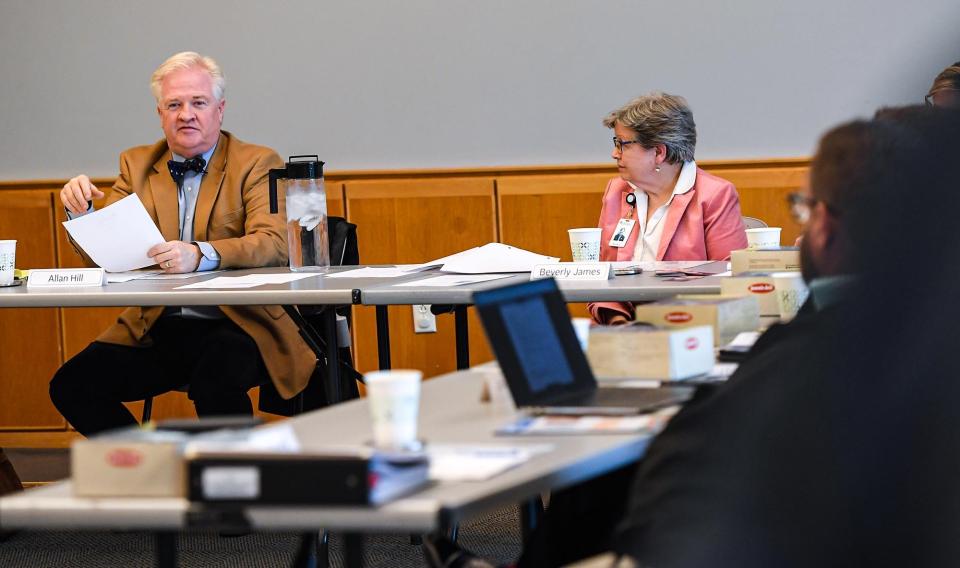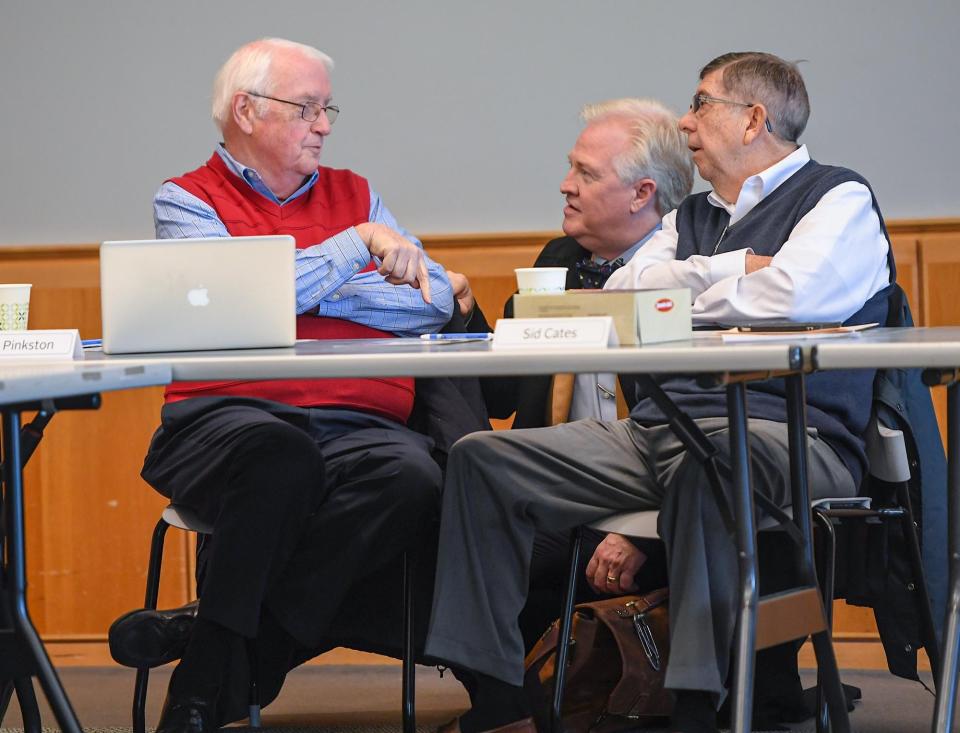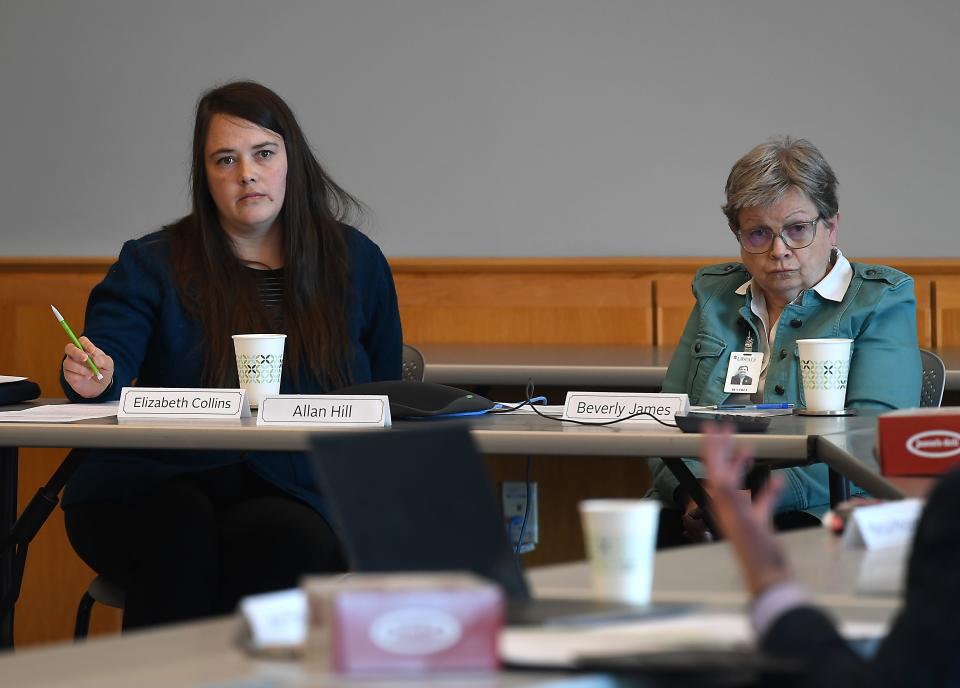Greenville library lags in development behind other SC counties. Employees blame leadership.
Before a July 2018 Greenville County Library branch meeting, employees sat, waiting with a list of questions for executive director Beverly James.
Staff wondered if recent technology, like automated check-outs, risked replacing library staff. They wanted to see if the library had plans for an internship program, and if James had ideas for increasing community engagement and staffing in a rapidly growing county.
But James arrived late with only thirty minutes to spare. An HR report shared with the Greenville News showed staff members were alarmed by James’ answers upon her arrival.
The report said James, who has been at the helm of the library for the past two decades, held viewpoints that “directly contradicted well-proven concepts and practices that staff were learning in library school and via professional resources.”
Since then, a growing group of former and current employees said nothing about James’ leadership has changed.
The News spoke to seven current employees and four former employees about their experiences at the county library. They believe GCLS lags behind other county libraries of its size due to decisions made by the current leadership and an apparent shift to a religious viewpoint amid current culture wars.
The News reached out for responses Sept. 25 and clarified their questions repeatedly on Sept. 27 and Oct. 3. James declined an interview for the story. The library sent email responses.
In an email Oct. 2, GCLS explained that public libraries use a variety of indicators to measure impact and performance.
“For example, number of library visits, program attendance, amount of materials borrowed and the hours our locations are open all reflect how useful the community finds Greenville County Library System resources,” the press statement said.
But employees pushed back and said years of going against staff expertise during book challenges, fewer training modules and subservience to a conservative library board have forced employees to leave the system. In 2022, when book challenges and anti-LGBTQ rhetoric raised questions about leadership, the library lost five employees every month on average, based on monthly HR reports shared with the Greenville News.
GCLS data also showed the yearly turnover rate jumped from 12% in 2018 to 20.4% in 2022.
Previous reporting by the Greenville News chronicled how the Board amplified a “culture of fear.” New reporting shows the board has not always worked together when setting policy. Instead, in the face of rampant complaints, Board Chairman Allan Hill acts independently, makes decisions, and directs James to carry them out.

Staff asked to remove Pride Month displays without full board weighing in
The Greenville News pieced together the decision-making process using public records, interviews and multiple confirmations.
On July 22, 2022, Teresa Lanford had 12 calls to make. The former access manager took a deep breath as her eyes scanned the script she was given. Her hands shook as she picked up the phone.
The Anderson Road Library was first on her list of 12 branches. All were listed in alphabetical order. She took a deep breath and read the script again:
“The Library Board has received complaints about Pride displays in GCLS facilities. The Library Board Chair has directed Bev to have the displays taken down. Please remove any Pride-related displays in your location by the end of today. Thank you.”
Each call took about 10 minutes. Access and Discovery Manager Brian Morrison told Lanford it was necessary the information was relayed over the phone. There was an unstated understanding, Lanford told the Greenville News.
No emails. No paper trails.
Back in her office, Lanford knew no branch manager was happy when she made calls to remove the displays. Some branch managers immediately began to cry.
“I had to collect myself between each call because it was so hard,” Lanford said.
She thought the worst was over, but on the next day, June 23, 2022 GCLS overturned James and Hill’s decision and asked Lanford to make another round of calls.
“It wasn’t quite as awful,” Lanford said. “It was unpleasant because I put everybody through a horrible situation … I was angrier at that point.”
Lanford said she had to leave it at James’ door.
“Ultimately, she’s responsible,” she said.
The decision to remove Pride displays last year marked the beginning of a political maelstrom that has included bans, anti-LGBTQ rhetoric in public meetings and questions about a library’s role as a public amenity. One board member, Laura Baker, resigned on July 5, 2022, as a result.
Despite it being advertised as a group decision, Baker implied in her resignation letter that the removal of Pride displays was a decision made between two people: James and Hill.
No board member responded to the News’ questions surrounding the decision-making, but public records reveal more details.
In an email sent on June 24, 2022, board member Bill Pinkston told James he did not recall the board making any decision in response to complaints about the Pride Month displays. He further said he was seeking “authoritative and accurate information” regarding the decision.

“At the moment, any response from me would be a statement of ignorance, which does not speak well of the Library or of the Board.”
Miles Dame, an advocate for the Freedom in Libraries Advocacy Group (FLAG) said the library director, supervised by the Board, had the power to set regulations for the staff.
“But Allan Hill, alone, is not the board,” Dame said. “If he gave her a directive to have the displays removed, that's out of line because it's not like he's her sole supervisor.”
The Board as a body serves as James’ supervisor.
“And if the Board did not vote on the decision, it definitely seems as though he's acting outside of the bounds of his role,” Dame said.
Library and anti-censorship advocates recently presented a petition to Greenville County Council for Hill’s removal from the library board. Two thousand people signed the petition that said, “Hill and several board members following his leadership have wasted resources on micromanaging internal library functions, blatantly violating First Amendment rights of the public and overreaching their authority in an attempt to directly manage county employees."
Employees say leadership goes against professional expertise
James was hired as the director in 2000 when libraries were grappling with new-century concerns. The advent of the internet had just begun, and new prospects of technology circled the market.
In 2001, the Greenville County Library System won an award for providing free internet classes to community members.
But despite the advancements, some of James’ decisions in her new role surprised her staff. For instance, the executive director removed two key American Library Association documents from the collection development policy ― the “freedom to read” statement, and the “Library Bill of Rights.”
Barbara Yonce, a former staff development officer, was James’ second in command at one point. She said the ALA documents include guiding principles for public librarians.
A review of collection development policies of the biggest county libraries shows Charleston and Richland Counties retained ALA directives. Neighboring counties like Spartanburg and Anderson also endorse ALA guidelines.
Then a decade later in 2012, James shot to national attention and invited derision from the library community. That year, an internal review committee, mostly made up of librarians at the Greenville County Library System, was given a task: figure out if a graphic novel, "Neonomicon," needed to be pulled from circulation. Alan Moore, who was best known for other works, such as “V for Vendetta” and “The Watchmen,” created "Neonomicon." The book was placed in the adult section because it dealt with heavy topics related to sexual assault and policing.
But when the book fell into the hands of a 14-year-old, who used an adult’s library card to check the book out, the teen’s parent challenged the book's circulation.
After assessing its content, the review committee retained the book. They said the book had artistic merit and its critical acclaim outweighed the disturbing content. However, James unilaterally overturned the committee’s recommendations.
GCLS questioned what the Neonomicon issue had to do with staff experience. But employees said it was representative of a continual trend.

“Beverly did not support the view of the staff,” Yonce said, adding that the book had gone through the collection development policy review, which still preserves library principles against censorship and intolerance.
“In that incident again, it was what she felt the board would want,” she continued. “She has always seemed to me to emphasize the fact that she served at the power or the discretion of the board. And I think that has been a motivating factor for her,” Yonce said.
Yonce said James doesn't regularly stand up for what the public library is supposed to represent. One such time involved Jonathan Newton.
The former Five Forks Library branch manager worked at GCLS for 17 years.
“(Newton) is known to be a rising star in the library world,” said Stephen Shelato, a former GCLS employee and FLAG member.
In 2019, a local group called "Mom’s Liberal Happy Hour SC" wanted to organize a drag queen story hour. Newton opened his branch for the event, which evoked backlash. Greenville County Councilor Butch Kirven told the Greenville News that if it were up to the council, “the event would be shut down immediately”.
“I believe that the County Council in no way condones the organization, its agenda, or supports this group’s purpose," Kirven said in a 2019 statement.
Newton later sued Greenville County in 2020 alleging wrongful termination, blaming the leadership’s response to the backlash and won a settlement worth $30,000. In a recent interview with the News, Newton echoed Yonce’s opinion and said James’ leadership was “submissive.”
“She’s not the type of person that would stand up to anybody over her but will turn around and lash out to the people underneath her,” he said.
Without direct leadership from James, Newton said the situation became untenable and “isolating” as a branch manager. “We had to do the best that we could,” Newton said.
In an email response sent Wednesday, Oct. 11, GCLS said disciplinary actions are taken when an employee violates policies outlined in the library's personnel handbook or fails to meet performance standards.
How does the Greenville library system compare to other libraries?
Greenville County Library System has the biggest clientele in the state and has more materials in circulation than Richland and Charleston Counties, according to 2020 SC Library data.
The library system sits in a high-growth area and is on the cusp of adding hundreds of new patrons to the system. But despite its reach, staff members said the system underperformed in key areas such as the number of librarians, full-time staff employed by the system and staff training modules.
Library professionals look at key performance markers such as the quality and size of collections and services at a library. They also gauge the number of outreach programs, designed to engage with the community that the library offers, former and current library employees said.
Other ways of measurement include employee satisfaction, how accessible and inclusive the library is for patrons and whether the library is compliant with regulations that govern its functions.
The News analyzed the most recent S.C. Library data and compared the three most populous counties of the state between 2015 and 2020.
In 2020, Greenville County Library System (GCLS) catered to the largest population, and had the largest collection and highest number of registered users compared to Richland and Charleston Counties.
But the Upstate-based library system was raking in a smaller revenue and had been doing so since 2015. In terms of engagement, the library system also had fewer library visits than Richland County in 2020 and fewer programs (2,014) for its patrons compared to Richland (6,591) and Charleston (5,122).
And, the library system also employed fewer staff members (268) than Charleston (347) and Richland County (368) in 2020 and employees also spent the least number of hours on training among the three.
GCLS said it invested in staff development through multiple avenues, in an email Oct. 11. "Employees have access to a multitude of training resources to further their professional development," the statement said. "GCLS also offers educational reimbursement and coordinates a scholarship fund through the Greenville Community Foundation for staff members wishing to further their education."
Yonce said staff development also included an investment in community engagement.
"There’s so much that libraries are capable of doing," she said.
Libraries have been welcoming places for new citizens, literacy centers for children and adults, and places of learning and imagination development, University of South Carolina Professor Nicole Cook added.
“Libraries are the heart of our communities,” Cook said.
Lately, they have increasingly become centers for information with access to passport services, tax preparation assistance as well as notary services.
Cook said, as one of the last free public community venues in society, libraries were imperative and central to American democracy. Moreover, libraries, if utilized well, could be a hub of innovation.
In 2016, the Greenville Library started a non-profit called S.C. Codes to teach computer programming. Inspired by a similar program in Louisville, Kentucky, library staff worked to create a physical space where community members could come into the library and learn how to be a web developer.

Shelato, a former staff development specialist, was involved in the project, alongside Morrison.
“I was the guy who made library staff follow rules,” he said.
Shelato is now associated with the Freedom in Libraries Advocacy Group (FLAG).
“Two cohorts started in Greenville, and we did two, full classes of 20 people each time. This was a big part of the culture when everybody wanted to be a web developer and they were being exploited, and still are, by these boot camps where it is like ― ‘give us $10,000 and we will teach you to code in three months,’” he continued. “We helped solve that problem.”
The non-profit grew into a statewide initiative in 2018 after the S.C. Dept. Of Commerce jumped into the mix to make free computer programming classes accessible to a wider audience.
The potential of a public library to serve its communities beyond the pages of a book is often understated. Shelato said the library leadership doesn’t do enough to move the needle of innovation forward.
"Greenville is growing faster. Greenville has more money coming into it. There's no reason to have a bare-bones library and no exciting new programs," Shelato said.
Devyani Chhetri covers SC politics for the Greenville News. You can reach her at dchhetri@gannett.com or @ChhetriDevyani on X.
Savannah Moss covers Greenville County politics and growth & development. Reach her at smoss@gannett.com
This article originally appeared on Greenville News: Employees: Greenville SC library losing staff due to current leadership

